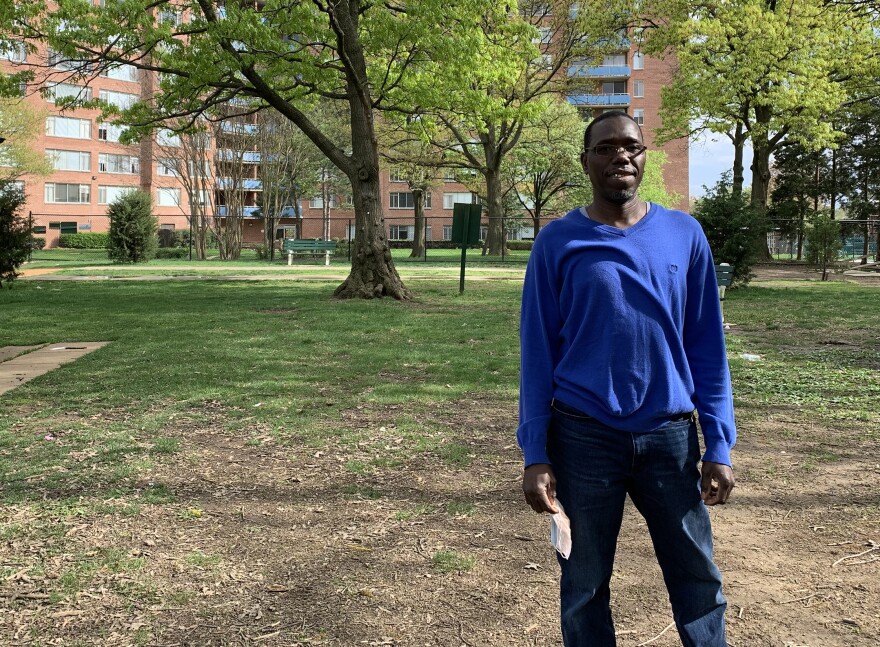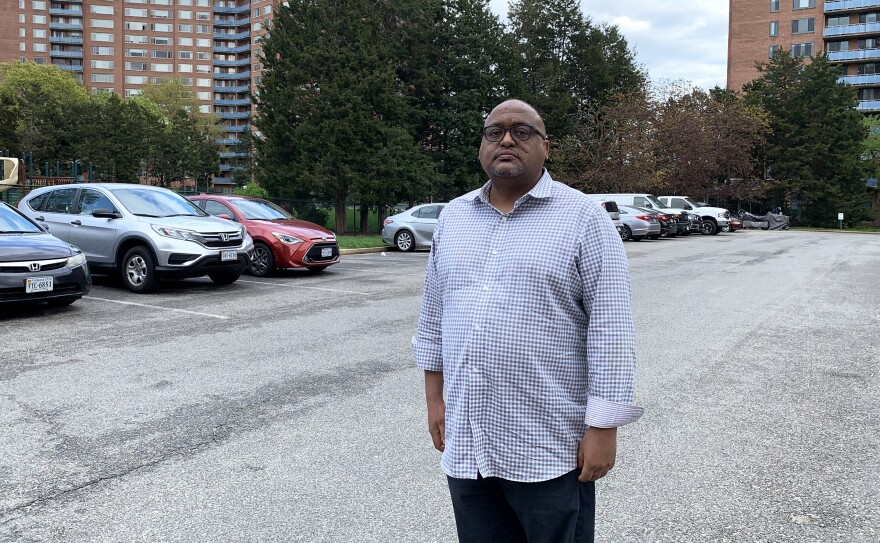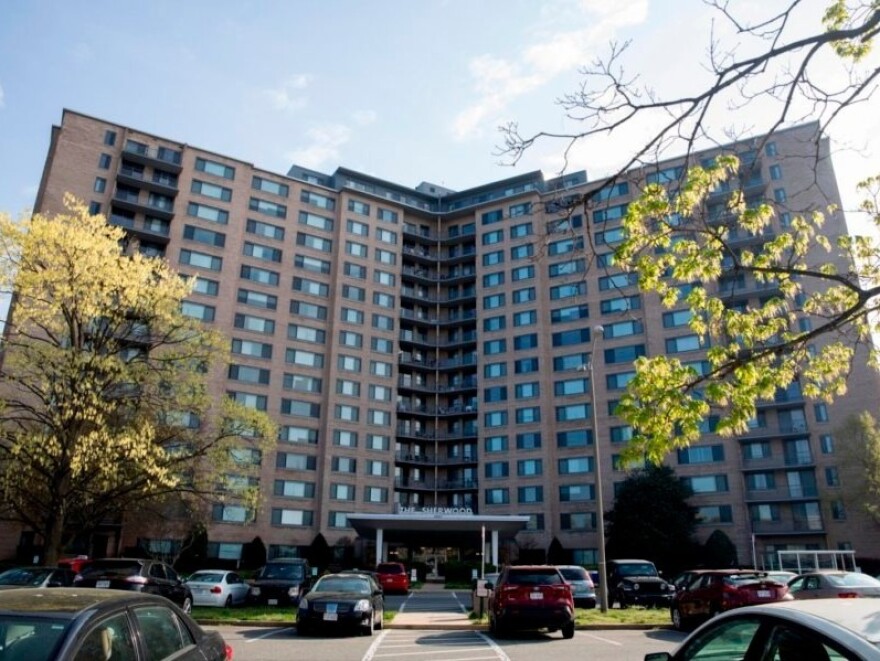The Southern Towers apartment complex in Alexandria, Va., —right outside Washington, D.C.,—is like a city. It has five massive high-rise apartment buildings, along with its own bank, dry cleaners, and 7-Eleven.
Buses stream through the parking lot, constantly picking up and dropping off tenants, who use the transit system to get to work at nearby office buildings, hotels, restaurants, and nursing homes.
About 4,000 people live here. About 60% are immigrants, mostly from Africa, and a majority of the tenants are Black. Many of them work in service industries —as cooks, Uber drivers, nursing aides— jobs that have been hit especially hard by the pandemic.
Many of these residents have struggled to pay rent over the past year and been threatened with eviction.
"I live month to month. So, I don't have money to pay rent. They take me in court," says Mahlet Kassa, an immigrant from Ethiopia who worked at a nursing home until last March. She's lived at Southern Towers for almost seven years.

Work dried up during pandemic
"I have two kids. I live alone. When the COVID is coming, I don't have a babysitter and I stay home with my children," she says, adding that she also worried about bringing the germ home if she continued to work.
Kassa received unemployment insurance and some rental assistance, but she says it was not enough to cover her $1,400 a month rent on time. So she's had to go to court several times, including this past month, to keep from losing her home.
Sami Bourma, another tenant, who emigrated from Sudan, says he had three jobs —including one as a cook at the National Institutes of Health— to help pay for his one-bedroom apartment. But work dried up during the pandemic, leaving him months behind on rent. He too has received aid and his cooking job recently resumed part-time, but he has yet to catch up.

"Couple hours here, couple days there, but we're still not able to cover the rent and expenses and food and supplies. Especially when you have kids home during this time, the expenses are going higher," says the father of three.
Bert Bayou, who has been organizing the tenants with a group called African Communities Together, says many of the people in this close-knit immigrant community worry that they've become the latest victims in the nation's affordable housing crisis.

Tenants especially worried about future
He says they've faced a flood of eviction proceedings — more than 500 by his group's count — since last summer. While an eviction moratorium and government rental aid have kept most of them housed for now, the current moratorium is set to expire June 30.
The tenants are especially worried about what will happen to them in a few years when a new Amazon headquarters opens nearby.
"It's very clear the idea is to renovate, to rebuild this apartment building and get rid of the African immigrant tenants from here and bring in Amazon corporate workers, where they know that those Amazon workers can pay more in rent," Bayou says.
The owner of Southern Towers —the Los-Angeles based CIM Group— would not agree to be interviewed for this story. But in a written statement to NPR, the company says that it is "unequivocally not looking to force any residents from the property."
CIM, which bought the complex last August for $506 million, says that many of the eviction filings were from the previous owner and that it currently has complaints against only 35 tenants. It also says it is working with these and other tenants to help them access available emergency rental assistance so they can stay in their homes.
City is trying to help tenants
Helen McIlvaine, Alexandria's director of housing, says the city is also trying to help tenants avoid eviction but it shares some of their concerns.
"We're concerned for folks who are very low income, have few housing options, who've been long-term tenants," she says.
Alexandria, like communities across the country, has been rapidly losing housing that's affordable for the kinds of low-wage workers who live at Southern Towers, and who help keep local economies humming. The city recently reported that it saw an 88% drop in affordable units since 2000.
The arrival of Amazon —an NPR sponsor— will likely add to the pressure. Southern Towers is only a few miles away from the proposed headquarters site. McIlvaine says companies like CIM don't invest hundreds of millions of dollars in property without hoping someday to renovate and upgrade.
"Some of that purchase price is premised on being able to raise the rents," she says, but adds that as recently as last fall the company told her that was not their thinking — at least in the near term.
"I think [the tenants'] fear is legitimate, but I would say it will take some time and a lot of money because the property is so large," McIlvaine says. "And I would hope that through our relationship with the owners and our collaboration with residents we would potentially be able to intervene" and come up with some way to preserve affordable units.
Tina Plerhoples Stacy, a researcher at the Urban Institute in Washington, says communities across the country are having similar trouble meeting their affordable housing needs, and the problem has been aggravated during the pandemic. City dwellers have been moving to suburbs like Alexandria looking for more space, which has priced out lower-wage tenants and hurt the companies that employ them.
"There's a lot of hope"
"They can't find enough minimum wage workers who want to work the job because people don't want to have an hour commute to get to a minimum wage position, and so employers have a really hard time finding employees and keeping them," she says. "They see higher turnover rates, when we have these housing challenges, and it harms the economy as a whole."
Stacy says the good news is there are many tools cities can use to increase affordable housing, some of which Alexandria is already doing — like making zoning changes for more density or giving property owners loans in exchange for guarantees to keep rents low. The Biden administration has also proposed spending hundreds of billions of dollars to expand the stock of affordable housing nationwide.
"There's a lot that can be done and I think there's a lot of hope," Stacy says.
Back at Southern Towers, tenants aren't so sure. Bayou says some of the immigrants are so confused and frustrated, they leave — or self-evict — as soon as they receive a warning notice from the landlord that they're late on rent and could face eviction. Mahlet Kassa, the nurse's aide, will be joining them soon.
"I decide to move next month," she says. "This is my choice."
Kassa found another apartment in Alexandria, which she hopes is a better deal. But she'll miss the support of her immigrant community, the reason she came to Southern Towers in the first place.
Copyright 2021 NPR. To see more, visit https://www.npr.org.


